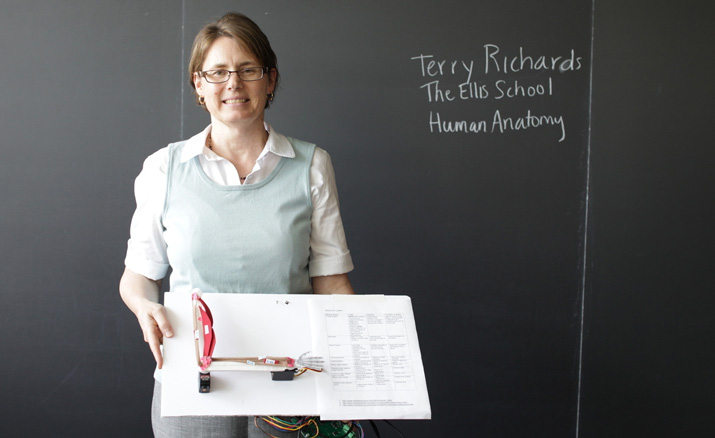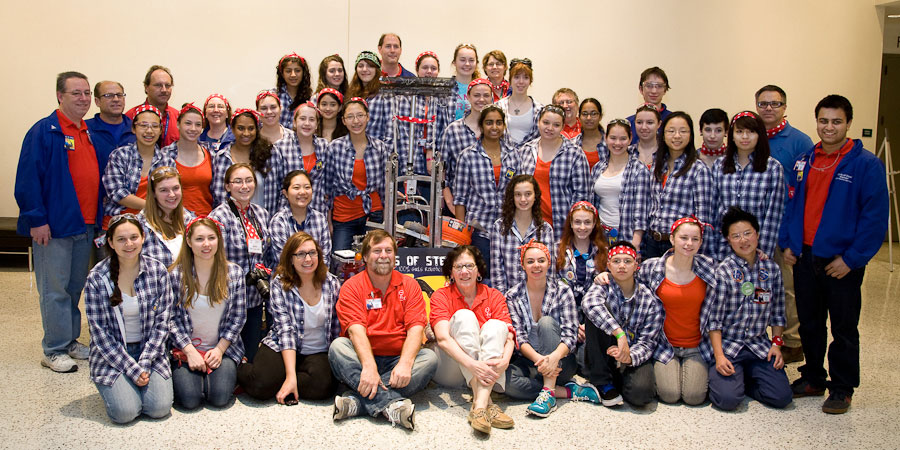
Robohub.org
Mentors of Steel: The role of mentoring in robotics education

The Girls of Steel – a competitive FIRST team located in Pittsburg, PA – is on a mission to draw more young women into engineering. We’ve already heard what it’s like to be part of an all-girls robotics team, we now catch up with the team’s mentors, Theresa Richards and George Kantor, to hear about their roles in inspiring and mentoring the team. Here’s what they have to say …
How and why did you become a mentor?
George: My lab, the Field Robotics Center at CMU, was approached by Patti Rote about creating an all-girls FIRST Robotics Competition Team in the summer of 2010. I have been involved in various K-12 robotics outreach activities dating back to the 90s, and I had always wanted to learn more about FIRST. So I offered to lead the team.
Theresa: I became a mentor because I was very interested in learning more about FIRST robotics and about how I could work with the FIRST program to support and encourage girls in the interdisciplinary field of robotics. The study of robotics includes all STEM fields.
Did you have a mentor when you were growing up? If so, can you tell us about this person and the impact they had on you?
George: Growing up, I had a swimming coach who taught me lessons about setting goals and perseverance. In graduate school and throughout my time as a researcher at CMU I have had a series of mentors who have helped shape my technical career.
Theresa: I had several mentors when I was growing up. Most of my mentors were my high school science teachers who offered opportunities for me to do activities with them outside of school. For example, my biology teacher invited me to participate as his teaching assistant at an evening class he taught. My chemistry teacher helped me get a part-time job and she introduced me to my college – the same one she attended, and my zoology teacher took a group of us on a special field trip and she arranged for an “extra credit” dissection lesson after school. These awesome teachers recognized my interest in science and made sure to offer opportunities. When I think back about it now, I feel so grateful that they took extra time with me. That’s what I try to do for my students.
Do you have any suggestions for teachers or others who may want to get started as a mentor?
George: Just do it! There are plenty of opportunities to mentor young people, and it is an extremely rewarding experience.
Theresa: Other teachers who are interested in finding out about a FIRST robotics team should go to the website and click “What teams and events are located in my area?” I bet they’ll find a robotics program that will welcome them with open arms. If the teacher feels unsure about being a robotics mentor, he/she should attend a meeting or two before making a decision. Working with the students is inspiring because of their interest in creating something and learning so many new things. And it’s amazing to hear a student say, “So that’s why we learned this in math or in physics” or “I never would have considered engineering if I weren’t on this team.”
What’s the hardest part about mentoring?
George: It is important to encourage people to dream big, but on the other hand aspiring engineers often have unrealistic expectations about what they can accomplish. Helping students define achievable goals often involves encouraging them not to pursue some of their more ambitious ideas, and delivering that message in a positive way can be a challenge. I want my students to believe they can do anything, but I also need to teach them to approach their dreams in a realistic way.
Theresa: The hardest part about mentoring – there really isn’t a hard part, except that having meetings during after school hours from 5 pm until 8:30 or later means we have some late nights, especially during the 6-week build season. Mentoring is a rewarding experience on multiple levels. I enjoy the experience of working together with students, and colleagues and parents who have similar interests of encouraging girls in STEM fields. Like they say in FIRST, “It’s the hardest fun you’ll ever have” – that goes for mentors as well as students.
Do girls need female role models?
George: Yes. It is inspiring for girls to see women in the roles they aspire to, especially in fields like computer science and engineering that are currently dominated by men.
Theresa: Girls need female role models in STEM fields in order learn about various careers and to be able to see themselves in various positions or careers in STEM fields. Girls also benefit from belonging to a network or group of girls who share similar interests while in high school, college, and beyond.
Which students should participate in robotics competitions?
George: All students, especially those with technical interests. Robotics competitions are easily accessible, and they provide an opportunity to learn valuable technical skills in a fun way. They also provide an opportunity to learn life skills that are useful regardless of what career they decide to pursue: teamwork, goal setting, time management, etc.
Theresa: I believe all girls will benefit in some way from joining the Girls of Steel or another FIRST robotics team. The level of the benefit will depend on their level of participation. Participation on the Girls of Steel FIRST robotics team can range from 4 to 20 hours a week during the year. The number of hours depends on the “season” – preseason, build season or competition season – and on a girl’s particular role on the team – e.g. leaders spend time preparing for team meetings and have additional leadership meetings to attend. Why do you recommend robotics competitions for everyone? Not only do the students apply what they’ve learned in computer science, math, science, and engineering classes they also learn that it can be fun to work hard. They learn so much about themselves by being a part of the team. For example, I’ve heard girls say things like “only girls on the team understand why I like ….”, “I found my best friends on the team”, “now I know the difference between a personal goal and a team goal” , “ Only you get my jokes,” and more.
There are many robotics competitions for students. Why FIRST?
George: I really like FIRST’s approach to competition. Winning is important, but greater importance is placed on cooperation and professionalism. FIRST has invented words that capture this spirit and are central to everything that FIRST does: “coopertition” and “gracious professionalism”. In addition, FIRST goes to extra efforts to make its events exciting. The games are well designed, with attention paid to making the matches interesting to watch. The competitions are narrated by professional emcees and the field set-up has a high production value. The result is something that is a cross between a rock concert, a sporting event, and a science fair.
Theresa: I really don’t know much about other competitions except that some involve “fighting robots” rather than “game playing robots,” and the robots vary in size. FIRST® (USFIRST.org) is an organization that promotes robotics competitions for all ages that involve more than just a robot. Our team competes at the FRC (FIRST Robotics Competition) level that involves designing and building a 120 lb. robot over a period of 6 weeks to play a game with 5 other robots on the field. The awards structure of FIRST promotes other aspects of the team – like fundraising (to raise money for registration fees), outreach, teamwork, public speaking, leadership, media, and more. We’ve found that having a FIRST team seems to be like running a business with students having the opportunity for major leadership roles. High School level FIRST teams are encouraged to support STEM awareness for younger people in the community. Publishing Lynn’s comic about the 2012 FRC season on our website and on Robohub is just one way the Girls of Steel FIRST robotics team contributes toward that goal.
Thank you both very much for your time, and best of luck to you and the Girls of Steel in future competitions!

tags: c-Education-DIY, education, FIRST, Girls of Steel, interview, Robohub focus on Robotics Education, Social aspect





